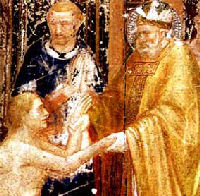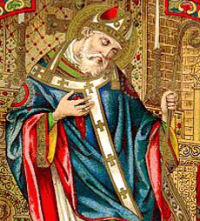» Enjoy our Liturgical Seasons series of e-books!
The Church celebrates the Memorial of St. Stanislaus (1030-1079). Stanislaus was the Bishop of Cracow, Poland. A champion of the liberty of the Church and of the dignity of man, he defended the lonely and the poor. When he reproached King Boleslaus II for his immoral life, the king himself killed him during Mass. He is the patron saint of Poland.
Meditation for Thursday of the Second Week of Easter
Our Holy Faith
1. During the second week after Easter the liturgy lays great emphasis on the virtue of faith. "And this is the victory which overcometh the world, our faith. . . [in the fact] that Jesus is the Son of God" (Epistle). In the Gospel the Lord reproaches the apostle Thomas for his unbelief. Thomas, falling on his knees before the Lord, confesses, "My Lord and my God." Jesus replies, "Because thou hast seen Me, Thomas, thou hast believed. Blessed are they that have not seen and have believed." The Communion prayer resumes the theme of the Gospel and calls out to us when we receive the Lord, "Put in thy hand and know the place of the nails, and be not faithless, but believing."
2. As newborn babes, yet wise by reason of faith! In the measure in which we acquire a childlike spirit, our faith be comes proportionately stronger and more perfect. Christianity is founded on faith. Faith is the beginning of salvation and the basis of all Christian thought. All Christian reasoning, all Christian values, all Christian undertakings, all Christian life, spring from the virtue of faith. Faith includes more than the mere conviction that God, the Supreme Being, exists. Faith requires that we accept and conform our lives to all those things which God has commanded us to accept. We must accept all His commands on faith, simply because God has spoken. By faith we make an offering of our whole being to God and subject ourselves to Him in the spirit of sacrifice. We make a voluntary renunciation of our own understanding and accept all that God reveals, out of a deep veneration for His infallibility. It is indeed no small matter to consecrate oneself to God as a sacrifice, together with all one's thoughts and desires; yet we do this by our faith. We do even more. To believe in God means to make Him our highest and greatest goal, the goal upon which we center all our thought and actions, all of our strivings, our whole life. We make ourselves and our whole life completely dependent on Him, and strive with all the strength of our heart and mind to serve Him. To believe in God means that a man must give himself and all that he is over to God and serve Him with a service that can be rendered to God alone. Only he can believe in God in this manner who possesses the Christian faith; and he who possesses this faith must make God the center of all his thoughts and desires. He must subject himself to God, to His every word and command, to His inspirations and guidance. Do we have such a faith?
"This is the victory which overcometh the world, our faith." But our faith in God has various degrees and stages of perfection. We should strive to attain to perfect faith, that "which overcometh the world." We have reached the first degree of faith when we live according to the maxims of the faith. "Faith, if it have not works, is dead in itself" (Jas. 2:17). He who knows the will of his master, but fails to carry it out, he who has the name of the Lord on his lips, but dishonors Him by his deeds, is worthy of greater punishment than he who has learned nothing of the faith. "Not everyone that saith to Me, Lord, Lord, shall enter into the kingdom of heaven; but he that doth the will of My Father who is in heaven, he shall enter into the kingdom of heaven" (Matt. 7:21).
To be joyful and free in our faith is the second degree of faith. He who lives by faith as the child in the house of his father, as the free man in his home, feels nothing of the burden of faith which the slave finds so onerous. The realms of faith become for him a familiar region, and he moves about in the light of faith with a naturalness and ease which others would find difficult or impossible. Even the regulations of spirit and heart, which faith imposes, become familiar and do not become burdensome.
To live by faith is the third and final stage in our growth in faith. Faith lives in us, and we live by faith. "In the head of the book it is written of me that I should do Thy will; O my God, I have desired it, and Thy law is in the midst of my hear' (Ps. 39:9). Those who live according to faith need make no laborious search to discover the will of God. Without compulsion and, as it were, by instinct they sense God's presence and recognize the hand of God in everything that befalls them, be it sweet or bitter, welcome or unwelcome. They have no need of artificial means for placing themselves in the presence of God. They feel themselves in the presence of God even when they are engaged in the most absorbing work, or when they are surrounded on all sides by men of the world. Their life both day and night, is a burning flame of love that consumes them in the service of God. Faith is no longer something exterior to them, but becomes the very soul of their life. It is this kind of faith that makes saints. Once we possess such faith, we readily overcome the world with its lusts and its self-love, and we allow ourselves no rest until we have complied with every law and every counsel which faith presents to us to arouse our love and our generosity.
3. Because we live by faith and according to the rules of faith, the world attacks us who are Christians. The world cannot endure the spirit which inspires us as Christians, because our world is in the realm of faith. The knowledge of it is not "found in the land of them that live in delights" (Job 28:13). The more we are misunderstood and abused by the world, the more we ought to thank God, for persecution is a good indication that God has endowed us with His spirit.
We must treasure and love the faith with which we were filled at the time of our baptism. We must not rest until it has pervaded our very flesh and blood, until we live by faith alone.
—Benedict Baur, OSB, The Light of the World
St. Stanislaus of Cracow
Stanislaus was born in 1030 and was educated at Gnesen and at Paris. After his ordination to the priesthood he was made a canon of the cathedral at Cracow as well as archdeacon and preacher. Upon the death of the bishop of Cracow, he was nominated bishop of the diocese by Pope Alexander II.
 The king at the time, Boleslaus II, trying to strengthen his own power, led an expedition against the grand duchy of Kiev, making himself very unpopular with the nobles of the country, who opposed his policies. St. Stanislaus of Cracow sided with the nobles, led by the king's brother, Ladislaus, and this brought him into conflict with the king.
The king at the time, Boleslaus II, trying to strengthen his own power, led an expedition against the grand duchy of Kiev, making himself very unpopular with the nobles of the country, who opposed his policies. St. Stanislaus of Cracow sided with the nobles, led by the king's brother, Ladislaus, and this brought him into conflict with the king.
Stanislaus had opposed the king before for his tyrannical ways and once confronted him boldly for his immoral behavior when Boleslaus had abducted the wife of a Polish nobleman and carried her off to his castle. No one seemed willing to face the king from a fear of his rage, but Stanislaus boldly went to the king and threatened excommunication if he did not change his ways. Furious, the king promised revenge on the bishop. Later, Stanislaus sided with the nobles in their opposition to the king's political policies, and the king accused him of being a traitor and condemned him to death.
At first the king commanded his soldiers to kill the bishop when he was celebrating Mass at St. Michael's chapel in Cracow, but the soldiers refused, fearing to bring down upon themselves the wrath of God. Undeterred, the king himself entered the church, drew his sword, and killed the bishop, ordering his soldiers to dismember the body.
Pope Gregory VII placed the country under interdict and Boleslaus fell from power, fleeing to Hungary, where he entered the monastery of Osiak to do penance for his crime. Stanislaus, canonized by Pope Innocent IV in 1253, is one of the patron saints of Poland.
—The One Year Book of Saints by Rev. Clifford Stevens
Patronage: Archdiocese of Cracow, Poland; Poland.
Symbols and Representation: Bishop being hacked to pieces at the foot of an altar.
Highlights and Things to Do:
- Read more about St. Stanislaus:
- Sometimes evil has to be confronted boldly, whatever the consequences. Brave men like St. Stanislaus of Cracow risked death in facing evil. There is little chance today that we will ever be in that danger, but we must always be willing to defend the truth, and it should be very clear, in the face of genuine evil, where we stand. Christ our Lord can expect no less from us. Say an extra prayer today for the gift of fortitude.
- Learn a little more about the city of Kracow where both St. Stanislaus and Pope John Paul II came from.
- For those who are extremely interested in knowing more about Polish history this online book, Polish Americans and Their Communities of Cleveland may prove to be a good source of information.
- The final work of Franz Liszt is the unfinished oratorio St. Stanislaus, for which he left two scenes (one and four) and two polonaises. Learn more about this oratorio here and if you are able find a copy and listen.
- St. Stanislaus' relics are in the The Wawel Royal Cathedral of St Stanislaus and St Wenceslaus in Cracow, Poland.








